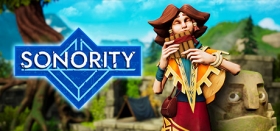
Sonority Interview
I got the opportunity to talk over Zoom with the developers at Hanging Gardens Interactive to talk about their newest game, Sonority; a music-based puzzle, adventure game… well, I would’ve but I got dropped in the middle of the interview and couldn’t get back in (damn you, technology!). Not to worry, we were able to figure something out later and I was able to ask some questions about the game.

Can you tell me who you are and what you do?
Hey, we are Hanging Gardens Interactive, a new indie developer from Stuttgart, Germany and we are currently developing the music-based puzzle adventure game Sonority.
What’s the inspiration behind Sonority?
Everyone in our team is a musician, from amateur to professional.
Everyone in our team is a musician, from amateur to professional. We all share a passion for music and hope to convey this with Sonority. Willi, the game designer and founder of Hanging Gardens, then had the great idea to combine music and puzzles and designed our main mechanic. Our ultimate goal for the game is to encourage people to make their own music and feel how much fun it is to create a melody.
Why does the player use a pan flute? Were alternate instruments considered?
We actually have plenty of different instruments that are all going to be relevant for gameplay and some puzzles will require multiple instruments to be solved.
What’s your approach with the puzzle design?
Every area in Sonority will have its own sound and feel. To design the puzzles of an area we start off with a rough idea of what we want it to sound and then write a piece of music that works for it. Then we pluck small melodies from the song and implement them into puzzles. This might sound simple, but striking a balance between the difficulty, sound and complexity of a puzzle is extremely challenging. The end result is the players building and “solving” a piece of music as they progress through an area.

The control scheme feels a little odd to me.
We are working hard to make Sonority’s controls the best they can be and are continually working on improvements. On a controller, the buttons and notes are mapped very similar to an instrument with each note corresponding to a finger, enabling the player to switch quickly between notes and play music. On a keyboard, the notes are mapped to 1-7, a standard hotkey setup. We would love you to expand on your issues, since a precise answer, or solution, to “odd” is hard to give.
(That’s my mistake. There was supposed to be a second part to that question. I was just a little confused wrapping my head around playing notes. On keyboard, my instinct was to press the corresponding letter to the note. If I had more time I would’ve gotten used to it.)
...Striking a balance between the difficulty, sound and complexity of a puzzle is extremely challenging.
How has the community affected your game? I predict there'll be a few attempts at playing Ocarina of Time songs.
We are very lucky to have a small but tight-knit community on our Discord server that has been very active from the beginning of development on. They’ve been instrumental and many things like playtesting would’ve been very much harder without their support.
Have there been any difficulties during development? A challenge or the like?
The scope of this project is beyond anything we’ve ever done before and that comes with the opportunity to learn a lot (read: make a metric ton of mistakes). Specifically, though, the biggest challenge to overcome was communicating efficiently. We have a very strong idea of what we want Sonority to be and to communicate that with all our potential players, contractors, voice actors, publisher, translators, and so on is a skill we had to acquire throughout the development.

I’m a little hard of hearing at times. Do you have anything that might help the hearing impaired?
Since Sonority is at its core a game about music, it’s impossible for deaf people to have the same experience as the non-hearing impaired. However, accessibility is important to us, so you will be able to finish Sonority even without the ability to hear.
...You will be able to finish Sonority even without the ability to hear.
What’s with all the stone heads?
Our stone heads are an entity collectively called “Zuzu”. They seem to understand everything and sometimes even help you out. Everything else you’ll have to find out for yourself.
What do you want out of this game?
We’d love to keep developing games with fresh ideas and cool new mechanics, so just selling enough to keep us afloat as a studio would already be an awesome success.
The demo was very short. Any reasons for that?
We’ve averaged a completion time of about 25m for this version of the demo and feel like it is a good introduction to the game without spoiling too much of the story. It also ends at a natural breakpoint, since the player transitions areas after the last puzzle of the demo.
Anyways, it was a rather enlightening session interview with the developers and if I had known about the game sooner, I would’ve asked way more questions. Sonority is expected to release early 2022 on PC (Windows, iOS, Linux) and it’s available to wishlist right now on Steam.






COMMENTS